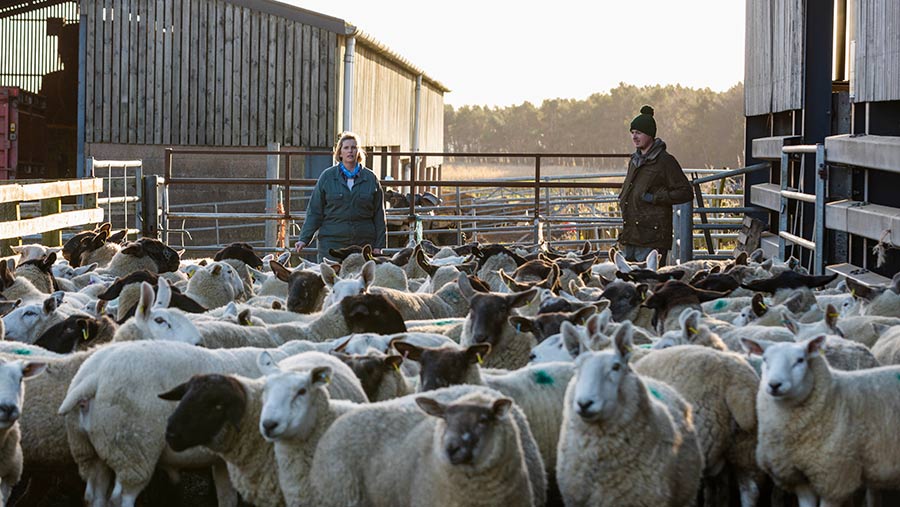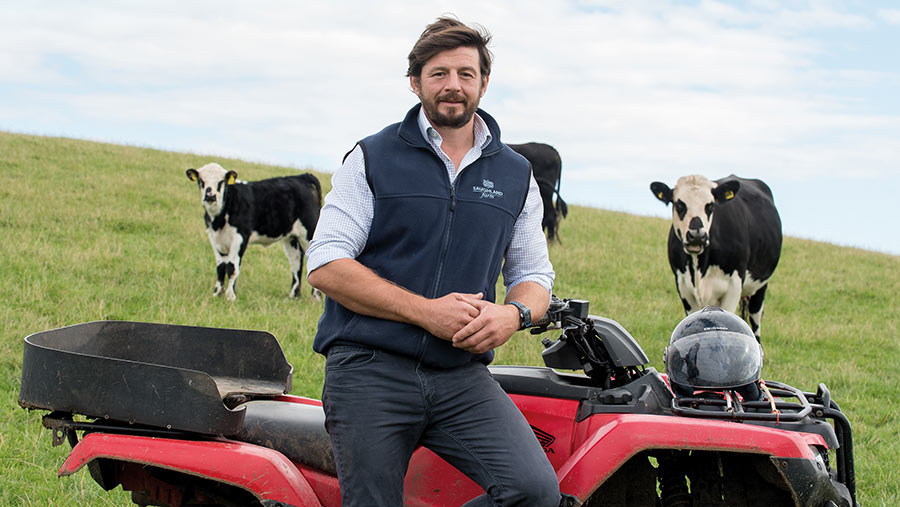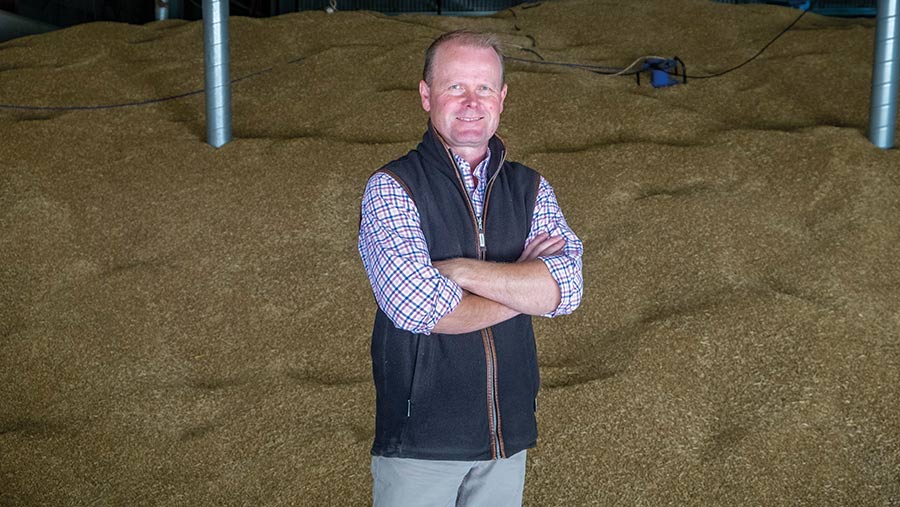Farm managers’ award-winning ways with staff
 © Istock.com/SolStock
© Istock.com/SolStock A common characteristic of those who have won the Farmers Weekly Farm Manager Award is their attention to staff management. We asked previous winners what works for them and their teams.
Past award winners manage vastly different businesses in scale and nature. The involvement of staff in the business is a common thread running through their approach.
Peter Eccles, East Lothian

Peter Eccles © Angus Findlay
Peter was farm manager at Saughland Farm in East Lothian and was also running his own business, Rockness Livestock, when he won the Farm Manager Award in 2020. He now works in his family’s farming business in the same area and continues to breed pedigree polled Herefords.
Sharing a vision for the business helps implement change and build a motivated and empowered team.
Whether it’s as little as a sit-down conversation with a sole employee or a team event within a larger organisation, setting out a vision for where the business is headed is an important first step.
See also: Nine tips on employing dairy staff for the first time
Involve staff in this process, take time to listen to their ideas and suggestions, work through in a consultation-type process and include their contributions as you set out short-, medium- and long-term goals or milestones for the business.
These can be used to put together a mission statement which encapsulates what you are about and what you are doing – this brings purpose and helps your workforce visualise what you are aiming to achieve. It can build excitement and enthusiasm too.
Rewarding good attendance and participation in such meetings or team events is equally important.
It could be as simple as having a BBQ following a meeting, or a quiz night and laying on food and refreshments, for example.
This approach has multiple benefits – first it brings the team together and second, by including their ideas they are invested in the process, which means there is a greater ability to motivate and incentivise them to achieve your business goals.
It’s important to ask for feedback over the days or weeks that follow. This ensures all have been given time to reflect or gather their thoughts and any further ideas.
This is particularly important for members who are less likely to contribute in the moment or in front of others. It also shows you value their involvement.
I’ve found such events helpful in getting to know and understand staff better and in identifying those potential leaders capable of taking on further responsibilities.
Equally, it can highlight areas of weakness or concern, and help you identify where further training or support could be aimed.
The more regularly you hold meetings or events, the easier to organise they become and the more everyone will get out of them. They only need to be quarterly or even just twice a year.
The teams I have been involved with have responded better as they become familiar with the process; it improves communication skills and lifts team morale.
It is also helpful to involve staff in discussions about company or business policy in forming staff handbooks covering areas such as codes of conduct and general etiquette when it comes to shared workspaces, tools and vehicles, for example.
Richard Price, Warwickshire

Richard Price © iagrm
Richard was managing the Lowther Estate in Cumbria when he won the Farm Manager Award in 2013. He has been managing the Tetworth Hall Estate in Bedfordshire for five years and runs his own consultancy, Ewematter Ltd. This provides succession and business planning for farms, estates and farming companies, as well as mentoring and supporting managers and farmers to navigate opportunities.
Above all, make time for people. Everyone is different and reacts differently. Formerly, wage slips were delivered by hand and provided a point of contact.
Try and make a point of visiting staff members at home, if possible. This provides that contact in a different environment and can help with understanding people – never presume.
Holding a weekly meeting, conducting an annual appraisal and involving staff with equipment purchases all help with communication, mutual understanding and motivation.
Tailor training to the job staff are doing, and ask them what training they would like to do.
Give members of the team days out relevant to their area – this could be at Lamma, Cereals, North Sheep, Scotsheep, the Dairy Event or local discussion groups.
Involve staff in other farm or estate projects, both for variety and to help team cohesion. Make a point of introducing guests to the farm or estate when possible.
Offer staff clothing and machinery branded with your logo – this will not suit all businesses but if you are providing workwear, make sure it is good quality kit that they will wear and want to wear.
Staff meals at lambing, harvest or other key times are a welcome gesture – and a Christmas party or meal, including partners, goes down well and shows appreciation.
Mike Shapland, Suffolk

Mike Shapland © Tim Scrivener
Mike is farm manager at James Foskett Farms in Suffolk, the position he held when he won the award in 2018. The business grows potatoes, onions, sugar beet, carrots, cereals and organic vegetables on 1,400ha. It employs 25 full-time and 105 seasonal staff.
- Clarity on contracts and job offers Ensure staff have clear contracts of employment and that job offers are very clear regarding all aspects of the offer.
- Staff representation and involvement Depending on the size and nature of the business, consider having employee representatives and a health and safety representative who join certain management meetings.
- Training Have an annual training plan which covers the basic training and staff development.
- Meetings These are held with seasonal staff to discuss upcoming work, accommodation, food safety, health and safety, and social events. Meetings are held with full-time staff ahead of planting and harvest campaigns, as well as a pre-Christmas meeting to review the year.
- Communication A daily text is sent to all staff to plan the next day so everyone is kept up to date, and a planting plan book with field maps and lots of information is issued to everyone.
- Off the farm Two or three social trips are organised each year for seasonal staff to theme parks or to London, to encourage them to see other parts of the UK.
- Awards An employee of the year award is given, voted on by the staff, with the results and prizes presented at the Christmas meeting.
- Accommodation We try really hard to make sure the accommodation we provide is good quality – the acid test is would I be happy if my son or daughter was moving in? Things like excellent wi-fi, plenty of washing machines, freezer capacity and good water pressure are important.
- Opinions and experience A leaving questionnaire for seasonal staff helps us gauge their experience and there are suggestion boxes which people can use anonymously.
Edward Vipond, Suffolk

Edward Vipond © Jason Bye
Edward has been farm manager at Troston Farms in Suffolk for eight years and was the farm manager category winner in 2021. He manages 1,542ha across four farm sites. Cropping is milling and feed wheat, feed and malting barley, milling and feed rye, spring beans, sunflowers and maize for AD.
- Involving employees in machinery purchases can help with motivation and inclusion. Staff need to buy in to the machinery they will be spending a lot of time operating. Feeling part of the decision-making process is very important. We discuss planned machinery purchases, looking at the options available on a tractor or sprayer, for example, and what the team’s view is on what’s important.
- Regular off-farm breakfast meetings are good for team building. These give the opportunity to get people away from the workplace and discuss both farming and non-farming topics.
- We discuss harvest labour at a pre-harvest breakfast before seasonal help arrives and at a further breakfast meeting with everyone included.
- The pre-arrival meeting focuses on the responsibilities of the full-time team with regard to the seasonal labour. As a result of these meetings we have a new emergency action plan as a laminated sheet detailing essential information for seasonal and full-time staff.
- Appraisals give an opportunity to give feedback on staff performance and suggest training that might bolster skill sets. I always give staff the opportunity to choose some additional non-mandatory training. However, appraisals should be a two-way thing, so also ask how well employees feel they are being managed and create an environment in which they feel they can voice their opinions.
